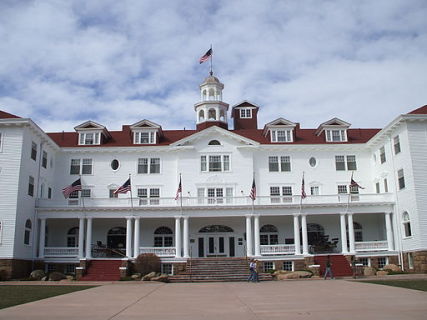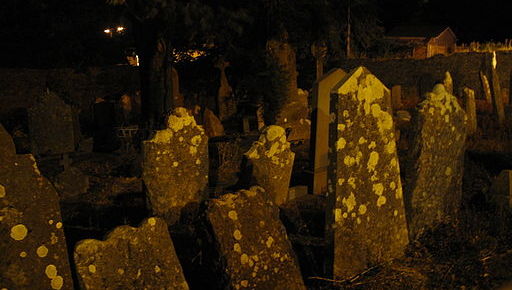
Temple Hill Graveyard, Cork, Ireland. Photo by user Guliolopez, via Wikimedia Commons.
Does skepticism take the fun out of Halloween?
When it comes to paranormal beliefs, skeptics are in the minority. In 2005, Gallup found that around three in four Americans believe in things like haunted houses, ghosts, or possession. (They also found in 2001 that belief in the paranormal had increased since 1990.)
This is evident in popular culture, where stories of supernatural encounter are widespread. Paranormal Activity is regarded as the most profitable film ever—its fifth sequel is due out early next year—and this week television network SyFy announced the tenth season renewal of Ghost Hunters, making it their longest-running “reality series.”
Given the immense popularity of paranormal beliefs, some people suggest that skeptics who investigate paranormal activity and uncover alternate, non-supernatural explanations are Halloween buzzkills.
Bryan Bonner and Matthew Baxter of the Rocky Mountain Paranormal Society, who have been investigating paranormal claims for over 20 years, disagree. Below, they tell me about their strangest investigations, how horror movies and ghost hunters inspired them to start investigating, what scares them, and what they discovered when they investigated the hotel that inspired The Shining.
Chris Stedman: You got involved in paranormal investigating in part due to your interest in horror movies, right?
Bryan Bonner: We were huge fans of the horror movie genre, and that inspired our interest. But the main reason we do this is that we both were witness to the other people involved in “ghost hunting.” [tweetable]We realized that what they were doing was not research—they were using their personal beliefs and confirmation bias to “prove” that locations were haunted.[/tweetable] This eventually brought the two of us together, and we’ve been using critical thinking and science in the name of paranormal research since.
CS: What are some of the strangest or most unusual claims you’ve investigated?
Matthew Baxter: [tweetable]Because of the popularity of paranormal media, we have seen the claims get exponentially more bizarre.[/tweetable] Some of the strangest have included a woman who knew that the demon from her favorite paranormal TV show was hiding in her young son’s bedroom, and even a family who were certain that they had demons when they actually had toxic mold in their home causing hallucinations. We’ve also become involved in cases with the police when people blame domestic violence on the Devil.
CS: Do you ever feel afraid during investigations? What scares you?
BB: The main concern that we have is for our own safety because we are going to private homes and do not know about the conditions of the people involved. And, of course, we do have normal fears that everyone has, but we try to not let them impact our investigations.
CS: You did an investigation at the Stanley Hotel, which inspired The Shining. What happened?

Stanley Hotel in Estes Park, Colorado, USA. Photo by user Rominator, via Wikimedia Commons.
MB: We were involved in a documentary about the claimed haunts at the Stanley, and after filming we learned that they were claiming that large deposits of magnetite, quartz, and limestone were the reason for the haunt. While it is impossible to prove that the said deposits would cause any paranormal event, we knew that we could at least find out if there was actually the claimed mineral content under the property.
We contacted the Natural Resources Conservation Service and three other branches of the federal government, and eventually conducted a study at the Stanley and some adjoining properties. We were able to use ground-penetrating radar, electromagnetic induction, several soil scientists, and geomagnetic satellites to obtain the results of the question about the minerals. The evidence is that there are no large deposits of any of the claimed minerals under the hotel. [tweetable]However, this has not stopped them from making the claim on every television show and ghost tour that they have.[/tweetable]
CS: Some people suggest that skepticism takes all the fun out of scary stories. How would you respond?
BB: [tweetable]While a good case of skepticism will change your perspective on claims of paranormal activity, we are animals that are conditioned to react to perceived dangers[/tweetable]—both real and imagined. This is why almost all people, regardless of background or belief, enjoy a good ghost story.
CS: Are there times when you “turn off” your skepticism and simply embrace a scary story? On Halloween, perhaps?
MB: [tweetable]After investigating all of the bizarre claims over the years, we have a hard time “turning off” the skepticism—but we still love a good scary story.[/tweetable]






